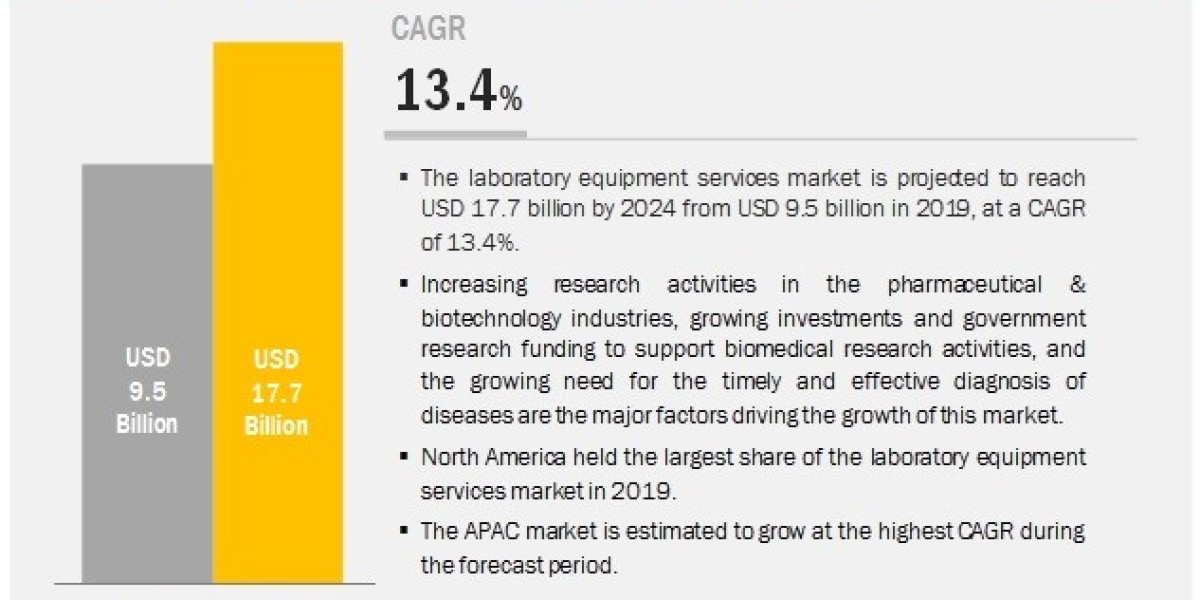The report "Laboratory Centrifuges Market is projected to reach USD 2.2 billion by 2026 from USD 1.8 billion in 2021, at a CAGR of 4.0% from 2021 to 2026. A centrifuge is used for spinning a liquid sample at high speeds to separate it into its components. Subjected to centrifugal force, the lighter components of the liquid sample move towards the axis while the denser components move away.
Centrifuges are widely used in research that requires the separation of various components. While this equipment has a long lifespan, it requires proper maintenance and care by trained professionals. Various bodies govern the manufacturing of such equipment to ensure the safety and efficiency of the performance. They are widely used from academic to clinical research for the separation/purification of cells, subcellular organelles, viruses, proteins, and nucleic acids. Factors such as increasing R&D investments and research grants; rising technological advancements and innovative rotor designs; increasing prevalence of infectious diseases leading to a higher volume of sample testing & cell-based research in laboratory centrifuges; and widening applications of laboratory centrifuges are supporting the growth of this market. The Asia Pacific market is estimated to be the fastest-growing regional market, mainly due to the presence of emerging economies such as China and India and the increasing R&D investments by pharmaceutical & biotechnology companies in this region.
Download PDF Brochure@ https://www.marketsandmarkets.com/pdfdownloadNew.asp?id=197749088
DRIVERS: Rising technological advancements and innovative rotor designs
Innovation in laboratory centrifuges focuses on enhancing convenience, speed, compactness, safety, efficiency, and accuracy. Rotors used in centrifuges were earlier made of tensile steel and then replaced with aluminum and titanium alloys. Carbon fiber rotors, in addition, are much lighter than their counterparts—these rotors weigh 8 kg, as opposed to earlier 21-kg aluminum rotors. Carbon fiber increases the flexibility of the rotor and makes them resistant to chemical corrosion and structural fatigue. For instance, the FIBERLite Fixed-Angle Rotor by Beckman Coulter (acquired by Danaher) and Thermo Scientific Fiberlite rotors are made of carbon fiber.
Moreover, the introduction of high-speed centrifuges has considerably reduced the time required for centrifugation, decreasing the possibility of hazards arising during the process. Advancements in designs have made replacing and maintaining key equipment parts, such as the rotors.
- For instance, Thermo Scientific Auto-Lock Rotor by Thermo Fisher Scientific, Inc. (US) enables users to switch rotors quickly and effectively.
- NuAire (US) developed a patented ClickSpin technology that enables quick, easy, and tool-free rotor changes.
In recent years, certain key players in the laboratory centrifuges market have launched centrifuges integrated with advanced rotors and other features. For instance:
- In 2021, Eppendorf AG (Germany) launched its Multipurpose Centrifuge 5910 Ri, which offers advanced features to enhance and simplify centrifugation. This centrifuge is the successor to the popular Centrifuge 5910 R. It offers an innovative touchscreen interface, optional connection to the new VisioNize Digital Lab Suite for remote monitoring, and the unique Universal rotor, which allows 50 mL conical tubes, plates, and 250 mL bottles without the need to change the rotor, rotor buckets, or adapters.
- In 2021, KUBOTA Corporation (Japan) launched the Benchtop Centrifuge S500T and Floor-Standing Refrigerated Centrifuge S500FR.
RESTRAINTS: High equipment costs
Centrifuges are expensive instruments and require significant expenditure post-purchase for regular and crucial maintenance. The high cost of these instruments can be attributed to their complex design, rotors, and microprocessors. In this market, ultracentrifuges are among the most expensive equipment. Their rotors alone can cost upwards of USD 5,000 to 7,000, and benchtop rotors and floor standing rotors can cost around USD 30,000 to 55,000.
Moreover, various accessories such as tubes for high-speed centrifuges are very expensive, and small scratches or cracks can render them unusable and need replacement. The high price of these centrifuges may hinder the growth of this market.
OPPORTUNITY: Integration of automation and advanced features in laboratory centrifuges
The integration of automation and robotics into laboratory centrifuges is expected to create more opportunities in the future. There is a considerable amount of research for the development of autonomous/robotic centrifuges. Some companies offer advanced centrifuges that can serve during hostile and challenging pandemic situations or handling hazardous biological samples. These centrifuges can be essential equipment into a biological or life sciences lab for research purposes and clinical labs for mass scale processing of the biohazardous sample for a massive scale diagnosis.
CHALLENGES: Exposure to hazardous aerosols and lab-acquired infections
The centrifugation of hazardous samples may result in exposure to chemical, biological, or radioactive agents. This can adversely affect the health of personnel or operators, increase the risk of injury and cross-infection among staff, and cause damage to the equipment. It is important to ensure that the samples used for centrifugation are balanced properly. An unbalanced sample may cause tubes to break or spill out during centrifugation and release harmful aerosols into the environment.
Request Sample Report:
“Equipment are expected to hold the largest share of the laboratory centrifuges market, by product in 2021.”
Based on product, the laboratory centrifuges market is segmented into equipment and accessories. In 2020, the equipment segment accounted for the largest share of the laboratory centrifuges market. The large share of the equipment segment can be attributed to the requirement of the repeated purchase of accessories such as tubes, bottles, and buckets.
“Benchtop centrifuges are expected to hold the largest share of the laboratory centrifuges market, by model type in 2021.”
Based on model type, the laboratory centrifuges market is segmented into benchtop and floor-standing centrifuges. Among these, the benchtop centrifuges segment accounted for the larger market share since these centrifuges are cost-effective, versatile, easy to use, smaller in size, and considerably lighter in weight. These advantages have resulted in their increased adoption in the laboratory centrifuges market.
“General purpose centrifuges are expected to hold the largest share of the laboratory centrifuges market, by intended use in 2021.”
Based on intended use, the laboratory centrifuges market is segmented into clinical, preclinical, and general purpose centrifuges. The general purpose centrifuges segment accounted for the largest market share in 2020, owing to an increase in cellular research and the diagnosis of blood-related diseases are the major factors driving the growth of this market.
“Fixed-angle rotors are expected to hold the largest share of the laboratory centrifuges market, by rotor design in 2021.”
Based on rotor design, the laboratory centrifuges market is segmented into swinging-bucket rotors, fixed-angle rotors, vertical rotors, and other rotors based on rotor design. The fixed-angle rotors segment accounted for the largest share in the laboratory centrifuge equipment market in 2020. Factors such as increasing protein research activities and advantages associated with fixed-angle rotors such as fast runtime and excellent resolution are driving the growth of this market.
Request 10% Customization: https://www.marketsandmarkets.com/requestCustomizationNew.asp?id=197749088
“North America commanded the largest share of the laboratory centrifuges market in 2021.”
Based on region, the laboratory centrifuges market is segmented into North America, Europe, Asia Pacific, and Rest of the World (RoW). In 2020, North America commanded the largest share of the laboratory centrifuges market. The large share of North America can be attributed to the rising R&D investments by government bodies, increasing emphasis on better management and the treatment of infectious diseases, and rapid growth in the pharmaceutical industry.
Key Market
The laboratory centrifuges market is highly consolidated in nature, with few well-established players operating in the overall market. The major players operating in this market are Thermo Fisher Scientific, Inc. (US), Danaher Corporation (US), and Eppendorf AG (Germany), KUBOTA Corporation (Japan), Sigma Laborzentrifugen GmbH (Germany), NuAire (US), Sartorius AG (Germany), Andreas Hettich GmbH & Co.KG (Germany), HERMLE Labortechnik GmbH (Germany), Cardinal Health (US), Agilent Technologies (US), Centurion Scientific (UK), QIAGEN N.V. (Netherlands), and Bio-Rad Laboratories, Inc. (US).
Report Link: Laboratory Centrifuges Market
About MarketsandMarkets™
MarketsandMarkets™ provides quantified B2B research on 30,000 high growth niche opportunities/threats which will impact 70% to 80% of worldwide companies’ revenues. Currently servicing 7500 customers worldwide including 80% of global Fortune 1000 companies as clients. Almost 75,000 top officers across eight industries worldwide approach MarketsandMarkets™ for their pain points around revenues decisions.
Our 850 fulltime analyst and SMEs at MarketsandMarkets™ are tracking global high growth markets following the "Growth Engagement Model – GEM". The GEM aims at proactive collaboration with the clients to identify new opportunities, identify most important customers, write "Attack, avoid and defend" strategies, identify sources of incremental revenues for both the company and its competitors. MarketsandMarkets™ now coming up with 1,500 Micro Quadrants (Positioning top players across leaders, emerging companies, innovators, strategic players) annually in high growth emerging segments. MarketsandMarkets™ is determined to benefit more than 10,000 companies this year for their revenue planning and help them take their innovations/disruptions early to the market by providing them research ahead of the curve.
MarketsandMarkets’s flagship competitive intelligence and market research platform, "Knowledge Store" connects over 200,000 markets and entire value chains for deeper understanding of the unmet insights along with market sizing and forecasts of niche markets.
Contact:
Mr. Aashish Mehra
MarketsandMarkets™ INC.
630 Dundee Road
Suite 430
Northbrook, IL 60062
USA: +1-888-600-6441
Email: [email protected]
Research Insight: https://www.marketsandmarkets.com/ResearchInsight/laboratory-centrifuge-market.asp
Visit Our Website: https://www.marketsandmarkets.com/
Content Source: https://www.marketsandmarkets.com/PressReleases/laboratory-centrifuge.asp
Related Reports
Track and Trace Solutions Market



